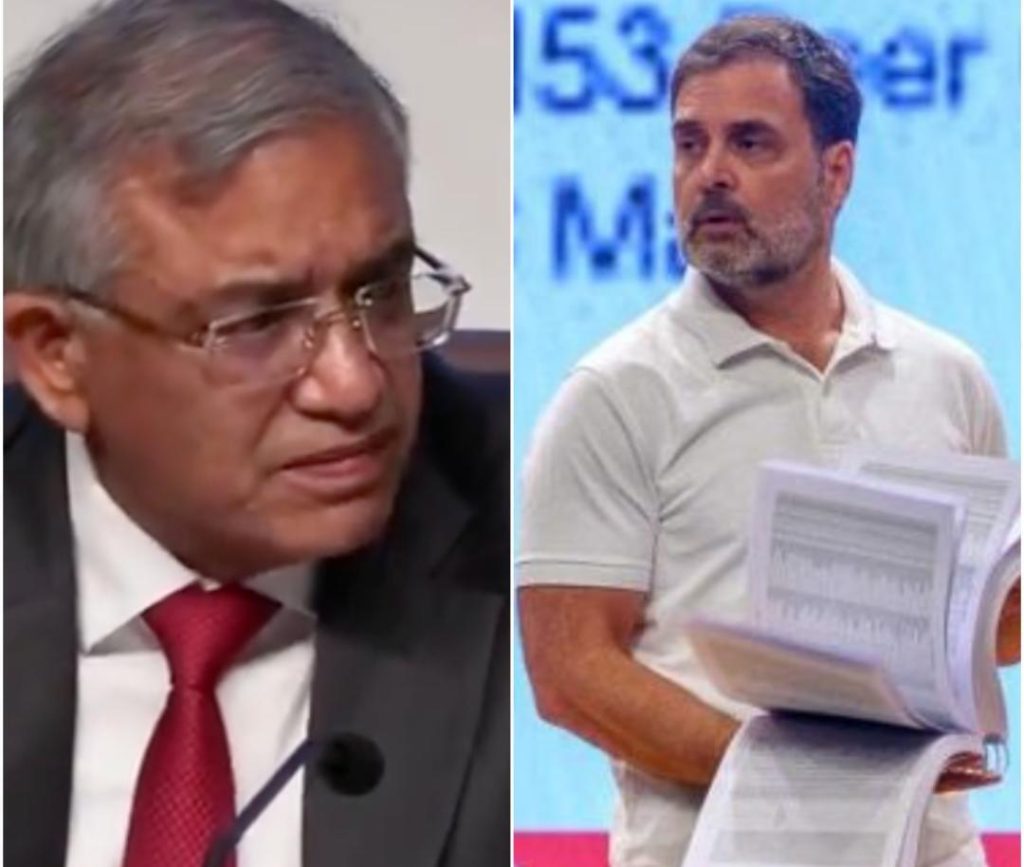
Vote Chori’ Phrase an Insult; Should We Share CCTV Footage of Mothers & Sisters Voting?: EC
The ongoing general elections in India have been marred by controversy and heated debates. One of the most recent issues to surface is the usage of the phrase “vote chori” (vote theft) by Congress leader Rahul Gandhi, which has been criticized by Chief Election Commissioner (CEC) Gyanesh Kumar. In a recent interview, Kumar slammed the term, calling it an insult to the Constitution. Furthermore, when asked about releasing surveillance footage from polling booths, Kumar raised concerns about voter privacy and questioned whether the Election Commission should share CCTV videos of any voter, including their mothers and sisters.
The “vote chori” phrase has been a hot topic of discussion in the Indian political landscape. Gandhi used this term to claim that the elections are rigged, and that the BJP is indulging in vote theft. However, Kumar, in his interview, disagreed with Gandhi’s stance, stating that the term is an insult to the Constitution and the democratic system.
“This is an insult to the Constitution and the democratic system,” Kumar said. “We are not going to tolerate such language. It’s a democracy, and we should respect the democratic system.”
Kumar’s criticism of the phrase is not just limited to its usage. He also expressed concerns about the damaging impact it can have on the democratic process. “When we use such language, it creates a sense of distrust and undermines the credibility of the democratic process,” he said.
But Kumar’s comments did not stop there. When asked about releasing surveillance footage from polling booths, which has been demanded by some in the wake of allegations of electoral malpractices, Kumar raised concerns about voter privacy. “Should the Election Commission share the CCTV videos of any voter, including their mothers, daughters-in-law?” he asked. “We need to maintain the privacy of voters, and we cannot compromise on it.”
Kumar’s concerns about voter privacy are valid. The release of surveillance footage could potentially compromise the privacy of voters, especially women and minorities who may be more vulnerable to harassment or intimidation. Moreover, the release of such footage could also create a culture of surveillance and mistrust, which could undermine the very fabric of our democracy.
However, some argue that the release of surveillance footage could help to increase transparency and accountability in the electoral process. They argue that the footage could be used to investigate allegations of electoral malpractices and to bring those responsible to justice.
But Kumar is not convinced. “Transparency is important, but we need to achieve it in a way that respects the privacy of voters,” he said. “We need to strike a balance between transparency and privacy.”
Kumar’s concerns about voter privacy are not new. In recent years, there has been a growing trend towards surveillance and monitoring of voters, which has raised concerns about privacy and security. The Election Commission has taken steps to improve the security and integrity of the electoral process, including the installation of CCTV cameras in polling booths and the use of electronic voting machines.
However, these measures have not been without controversy. Some have raised concerns about the potential for abuse or misuse of the surveillance footage, which could compromise the privacy of voters. Others have argued that the use of surveillance cameras in polling booths is a violation of the right to privacy and could create a culture of surveillance and mistrust.
In conclusion, the “vote chori” phrase is an insult to the Constitution and the democratic system. It undermines the credibility of the democratic process and creates a sense of distrust among voters. While transparency is important, it is equally important to respect the privacy of voters. The Election Commission should maintain a balance between transparency and privacy, and should not compromise on the privacy of voters.






